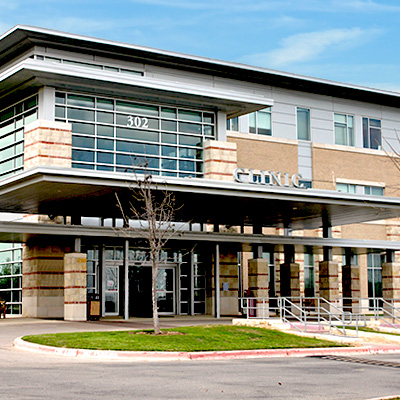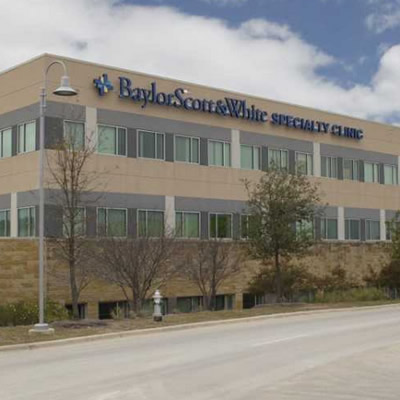Comprehensive wellness and OBGYN care for women of all ages
Your gynecologist is an expert in the unique complexities of the female body and can provide care for a broad and diverse range of health concerns.
At Baylor Scott & White, you have access to compassionate obstetrics and gynecology care and a comprehensive range of gynecology services, from annual exams and preventive screenings to specialized surgical procedures, to help you achieve better health at every age.
Obstetrics and gynecology care for all conditions
Gynecologists diagnose and treat issues relevant to women’s health and the female reproductive system, while obstetricians support you with pregnancy, labor and delivery and postpartum issues. Providers trained in both branches of women's healthcare are called obstetrician-gynecologists or OBGYNs.
Your needs for gynecologic care change as your body evolves. The right provider for you may also change depending on your needs, preferences and stage of life. Obstetricians-gynecologists provide a continuum of care for women, starting with the first visit in the early teenage years, through your reproductive years, the time leading up to menopause, the post-menopause years and beyond.
There are many good reasons to make time for an annual OBGYN visit. A few of the many things your obstetrician-gynecologist can help you with include:
- Bladder issues such as incontinence (leaking urine) and urinary tract infections
- Breast health checkups
- Sexual health concerns around sexuality and intimate relationships, including safe sex practices and sexually transmitted disease prevention and management
- Family planning and birth control
- Fertility and reproductive health concerns
- Menopause-related concerns, such as hot flashes, sexual dysfunction, vaginal dryness, painful intercourse and mood swings
- Menstrual problems and premenstrual syndrome (PMS)
- Osteoporosis
- Pre-pregnancy counseling and support throughout pregnancy, from prenatal visits through labor and delivery
- Reproductive endocrinology, thyroid dysfunction and other hormone disorders
- Urogynecologic issues, such as bowel control problems, pelvic organ prolapse and pelvic pain
In addition to helping with health conditions and concerns, your OBGYN can advise you on healthy eating, exercise and other lifestyle habits that promote good overall health.
You can also talk to your gynecologist about women’s mental health issues that affect your quality of life, such as stress, anxiety and depression.
Preventive OBGYN care for all women
Your journey toward better gynecologic health starts with preventing and detecting gynecologic disorders. This is accomplished through regular obstetrics and gynecology checkups, screening tests and preventive services.
Preventive care may include:
- Breast imaging to evaluate benign breast lumps, such as cysts and fibroadenomas
- Clinical breast exams
- Genetic testing to help determine your risk of gynecologic or breast cancers
- Human papillomavirus (HPV) test to detect types of HPV that are more likely to lead to cervical cancer
- The HPV vaccine, if appropriate for your age, to prevent cervical cancer
- Mammograms to screen for breast cancer
- Pap tests to identify precancerous changes that can lead to cervical cancer
- Pelvic exams to check for signs of reproductive system diseases
Advanced obstetrics and gynecology treatments and services
If your provider suspects you may have a gynecologic disorder, you have many diagnostic procedures and treatment options available to you. Your provider will work closely with you to develop a personalized plan of action.
Imaging techniques
Pelvic ultrasounds detect abnormalities in the pelvis, such as endometrial polyps, ovarian cysts, fibroid tumors and other uterine growths.
CT scans provide a detailed view of the reproductive organs and surrounding tissues, which can help pinpoint the source of pelvic pain, look for abscesses and other signs of infection, or evaluate pelvic masses, including suspected cancers.
MRI scans create images that aid in the diagnosis of problems, such as uterine fibroids, which can cause abnormal menstrual bleeding and may affect fertility.
Surgical procedures
The gynecologists at Baylor Scott & White perform a variety of minimally invasive surgical procedures to:
- Address abnormal bleeding, such as dilation and curettage and endometrial ablation
- Identify and treat cervical cancer, such as cervical loop electrosurgical excision procedure (LEEP) and colposcopy
- Identify and treat conditions affecting the uterus, such as hysteroscopy (a procedure to view the uterus) and hysterectomy (removal of the uterus)
- Reconstructive surgery for urogynecology conditions, such as pelvic organ prolapse
Symptom management
Your gynecologist can help you manage symptoms in various ways. Possible options include relaxation techniques to manage pain, pelvic floor physical therapy to strengthen pelvic floor muscles and medications such as hormone replacement therapy.
These and many other techniques can be useful for conditions such as premenstrual syndrome, painful intercourse, pelvic prolapse, overactive bladder, and for providing effective menopause care.
Find an OBGYN near you
You can find comprehensive obstetrics and gynecology care at Baylor Scott & White locations throughout North and Central Texas. No matter which location you choose, you’ll have access to women’s health services throughout our system.
If you need a specialist, such as a gynecologic oncologist, your referral will be seamless, and your specialist can communicate with your OBGYN throughout your care.

Baylor Scott & White All Saints Medical Center - Fort Worth
1400 8th Ave , Fort Worth, TX, 76104
Baylor Scott & White Clinic - Austin North Burnet
2608 Brockton Dr , Austin, TX, 78758- Monday: 8:00 am - 5:00 pm
- Tuesday: 8:00 am - 5:00 pm
- Wednesday: 8:00 am - 5:00 pm
- Thursday: 8:00 am - 5:00 pm
- Friday: 8:00 am - 5:00 pm

Baylor Scott & White Clinic - Brenham Hwy 290
604 US 290 , Brenham, TX, 77833- Monday: 7:00 am - 7:00 pm
- Tuesday: 7:00 am - 5:00 pm
- Wednesday: 7:00 am - 5:00 pm
- Thursday: 7:00 am - 7:00 pm
- Friday: 7:00 am - 5:00 pm
- Saturday: 8:00 am - 12:00 pm

Baylor Scott & White Clinic - Cedar Park
910 E Whitestone Blvd , Cedar Park, TX, 78613- Monday: 8:00 am - 5:00 pm
- Tuesday: 8:00 am - 5:00 pm
- Wednesday: 8:00 am - 5:00 pm
- Thursday: 8:00 am - 5:00 pm
- Friday: 8:00 am - 5:00 pm
- Monday: 7:00 am - 4:30 pm
- Tuesday: 7:00 am - 4:30 pm
- Wednesday: 7:00 am - 4:30 pm
- Thursday: 7:00 am - 4:30 pm
- Friday: 7:00 am - 4:30 pm
- Saturday: 9:00 am - 4:30 pm
- Sunday: 9:00 am - 4:30 pm

Baylor Scott & White Clinic - College Station Rock Prairie
800 Scott and White Dr , College Station, TX, 77845- Monday: 7:30 am - 5:00 pm
- Tuesday: 7:30 am - 5:00 pm
- Wednesday: 7:30 am - 5:00 pm
- Thursday: 7:30 am - 5:00 pm
- Friday: 7:30 am - 5:00 pm

Baylor Scott & White Clinic - Pflugerville Medical Center
2600 E Pflugerville Pkwy Ste 200, Pflugerville, TX, 78660- Monday: 8:00 am - 5:00 pm
- Tuesday: 8:00 am - 5:00 pm
- Wednesday: 8:00 am - 5:00 pm
- Thursday: 8:00 am - 5:00 pm
- Friday: 8:00 am - 5:00 pm
- Monday: 7:30 am - 4:00 pm
- Tuesday: 7:30 am - 4:00 pm
- Wednesday: 7:30 am - 4:00 pm
- Thursday: 7:30 am - 4:00 pm
- Friday: 7:30 am - 4:00 pm

Baylor Scott & White Clinic - Round Rock 302 University
302 University Blvd , Round Rock, TX, 78665- Monday: 8:00 am - 5:00 pm
- Tuesday: 8:00 am - 5:00 pm
- Wednesday: 8:00 am - 5:00 pm
- Thursday: 8:00 am - 5:00 pm
- Friday: 8:00 am - 5:00 pm

Baylor Scott & White Clinic - Santa Fe
1402 W Ave H , Temple, TX, 76504- Monday: 8:00 am - 5:00 pm
- Tuesday: 8:00 am - 5:00 pm
- Wednesday: 8:00 am - 5:00 pm
- Thursday: 8:00 am - 5:00 pm
- Friday: 8:00 am - 5:00 pm
- Monday: 7:00 am - 4:30 pm
- Tuesday: 7:00 am - 4:30 pm
- Wednesday: 7:00 am - 4:30 pm
- Thursday: 7:00 am - 4:30 pm
- Friday: 7:00 am - 4:30 pm

Baylor Scott & White Clinic - Temple
2401 S 31st St , Temple, TX, 76508- Monday: 8:00 am - 5:00 pm
- Tuesday: 8:00 am - 5:00 pm
- Wednesday: 8:00 am - 5:00 pm
- Thursday: 8:00 am - 5:00 pm
- Friday: 8:00 am - 5:00 pm

Baylor Scott & White Clinic - Temple Professional Plaza II
1713 SW H K Dodgen Loop Bldg II, Ste 100, Temple, TX, 76502- Monday: 8:00 am - 6:00 pm
- Tuesday: 8:00 am - 6:00 pm
- Wednesday: 8:00 am - 6:00 pm
- Thursday: 8:00 am - 6:00 pm
- Friday: 8:00 am - 12:00 pm

Baylor Scott & White Medical Center - Austin
5245 W US Hwy 290 Service Rd , Austin, TX, 78735
Baylor Scott & White Medical Center - Brenham
700 Medical Pkwy , Brenham, TX, 77833
Baylor Scott & White Medical Center - Buda
5330 Overpass Rd , Buda, TX, 78610
Baylor Scott & White Medical Center - Centennial
12505 Lebanon Rd , Frisco, TX, 75035
Baylor Scott & White Medical Center - College Station
700 Scott and White Dr , College Station, TX, 77845
Baylor Scott & White Medical Center - Frisco
5601 Warren Pkwy , Frisco, TX, 75034
Baylor Scott & White Medical Center - Grapevine
1650 W College St , Grapevine, TX, 76051
Baylor Scott & White Medical Center - Hillcrest
100 Hillcrest Medical Blvd , Waco, TX, 76712
Baylor Scott & White Medical Center - Irving
1901 N MacArthur Blvd , Irving, TX, 75061
Baylor Scott & White Medical Center - Lake Pointe
6800 Scenic Dr , Rowlett, TX, 75088
Baylor Scott & White Medical Center - Lakeway
100 Medical Pkwy , Lakeway, TX, 78738
Baylor Scott & White Medical Center - Marble Falls
810 W State Hwy 71 , Marble Falls, TX, 78654
Baylor Scott & White Medical Center - McKinney
5252 W University Dr Highway 380 at Lake Forest Drive, McKinney, TX, 75071
Baylor Scott & White Medical Center - Pflugerville
2600 E Pflugerville Pkwy Ste 100, Pflugerville, TX, 78660
Baylor Scott & White Medical Center - Plano
4700 Alliance Blvd , Plano, TX, 75093
Baylor Scott & White Medical Center - Round Rock
300 University Blvd , Round Rock, TX, 78665
Baylor Scott & White Medical Center - Temple
2401 S 31st St , Temple, TX, 76508
Baylor Scott & White Medical Center - Waxahachie
2400 N Interstate 35E , Waxahachie, TX, 75165
Baylor Scott & White OB/GYN Clinic - Waco
120 Hillcrest Medical Blvd Office Building 2, Ste 201-2, Waco, TX, 76712- Monday: 8:00 am - 5:00 pm
- Tuesday: 8:00 am - 5:00 pm
- Wednesday: 8:00 am - 5:00 pm
- Thursday: 8:00 am - 5:00 pm
- Friday: 8:00 am - 5:00 pm

Baylor Scott & White Obstetrics & Gynecology - Frisco
4461 Coit Rd Ste 205, Frisco, TX, 75035- Monday: 8:00 am - 4:45 pm
- Tuesday: 8:00 am - 4:45 pm
- Wednesday: 8:00 am - 4:45 pm
- Thursday: 8:00 am - 4:45 pm
- Friday: 8:00 am - 4:30 pm

Baylor Scott & White Obstetrics & Gynecology - Grapevine
1631 Lancaster Dr Ste 370, Grapevine, TX, 76051- Monday: 8:00 am - 5:00 pm
- Tuesday: 8:00 am - 5:00 pm
- Wednesday: 8:00 am - 5:00 pm
- Thursday: 8:00 am - 5:00 pm
- Friday: 8:00 am - 5:00 pm

Baylor Scott & White Obstetrics & Gynecology - Rockwall
1005 W Ralph Hall Pkwy Ste 115, Rockwall, TX, 75032- Monday: 8:00 am - 5:00 pm
- Tuesday: 8:00 am - 5:00 pm
- Wednesday: 8:00 am - 5:00 pm
- Thursday: 8:00 am - 5:00 pm
- Friday: 8:00 am - 5:00 pm

Baylor Scott & White Obstetrics & Gynecology - Rowlett
9500 Lakeview Pkwy Ste 100, Rowlett, TX, 75088- Monday: 8:00 am - 5:00 pm
- Tuesday: 8:00 am - 5:00 pm
- Wednesday: 8:00 am - 5:00 pm
- Thursday: 8:00 am - 5:00 pm
- Friday: 8:00 am - 5:00 pm

Baylor Scott & White Obstetrics & Gynecology - Waxahachie
2460 N Interstate 35E Ste 225, Waxahachie, TX, 75165- Monday: 9:00 am - 4:30 pm
- Tuesday: 9:00 am - 4:30 pm
- Wednesday: 9:00 am - 4:30 pm
- Thursday: 9:00 am - 4:30 pm
- Friday: 9:00 am - 4:30 pm

Baylor Scott & White Park Lane OB/GYN Associates
9101 N Central Expy Ste 250, Dallas, TX, 75231- Monday: 8:00 am - 4:30 pm
- Tuesday: 8:00 am - 4:30 pm
- Wednesday: 8:00 am - 4:30 pm
- Thursday: 8:00 am - 4:30 pm
- Friday: 8:00 am - 4:30 pm

Baylor Scott & White Specialty Clinic - Harker Heights
907 Mountain Lion Cir , Harker Heights, TX, 76548- Monday: 8:00 am - 5:00 pm
- Tuesday: 8:00 am - 5:00 pm
- Wednesday: 8:00 am - 5:00 pm
- Thursday: 8:00 am - 5:00 pm
- Friday: 8:00 am - 5:00 pm

Baylor Scott & White Specialty Clinic - Killeen Hemingway
2405 S Clear Creek Rd , Killeen, TX, 76549- Monday: 8:00 am - 5:00 pm
- Tuesday: 8:00 am - 5:00 pm
- Wednesday: 8:00 am - 5:00 pm
- Thursday: 8:00 am - 5:00 pm
- Friday: 8:00 am - 5:00 pm

Baylor Scott & White Specialty Clinic - Lakeway
200 Medical Pkwy , Lakeway, TX, 78738- Monday: 8:00 am - 5:00 pm
- Tuesday: 8:00 am - 5:00 pm
- Wednesday: 8:00 am - 5:00 pm
- Thursday: 8:00 am - 5:00 pm
- Friday: 8:00 am - 5:00 pm

Baylor Scott & White Specialty Clinic - Marble Falls
800 W State Hwy 71 , Marble Falls, TX, 78654- Monday: 8:00 am - 5:30 pm
- Tuesday: 8:00 am - 5:30 pm
- Wednesday: 8:00 am - 5:30 pm
- Thursday: 8:00 am - 5:30 pm
- Friday: 8:00 am - 5:30 pm

Baylor Scott & White Specialty Clinic - Salado
213 Millcreek Dr Ste 190, Salado, TX, 76571- Monday: 8:00 am - 5:00 pm
- Tuesday: 8:00 am - 5:00 pm
- Wednesday: 8:00 am - 5:00 pm
- Thursday: 8:00 am - 5:00 pm
- Friday: 8:00 am - 5:00 pm

Baylor Scott & White Surgicare - Dallas
4020 Junius St , Dallas, TX, 75246- Monday: 6:00 am - 5:00 pm
- Tuesday: 6:00 am - 5:00 pm
- Wednesday: 6:00 am - 5:00 pm
- Thursday: 6:00 am - 5:00 pm
- Friday: 6:00 am - 5:00 pm

Baylor Scott & White Surgicare - Garland
530 Clara Barton Blvd Ste 100, Garland, TX, 75042- Monday: 6:00 am - 5:00 pm
- Tuesday: 6:00 am - 5:00 pm
- Wednesday: 6:00 am - 5:00 pm
- Thursday: 6:00 am - 5:00 pm
- Friday: 6:00 am - 5:00 pm

Baylor Scott & White Women's Health Group
3600 Gaston Ave Wadley Tower, Ste 1158, Dallas, TX, 75246- Monday: 9:00 am - 5:00 pm
- Tuesday: 9:00 am - 5:00 pm
- Wednesday: 9:00 am - 5:00 pm
- Thursday: 9:00 am - 5:00 pm
- Friday: 9:00 am - 4:30 pm

Baylor Scott & White Women’s Health Specialists - Waxahachie
2460 N Interstate 35 E Ste 165, Waxahachie, TX, 75165- Monday: 8:00 am - 5:00 pm
- Tuesday: 8:00 am - 5:00 pm
- Wednesday: 8:00 am - 5:00 pm
- Thursday: 8:00 am - 5:00 pm
- Friday: 8:00 am - 5:00 pm
